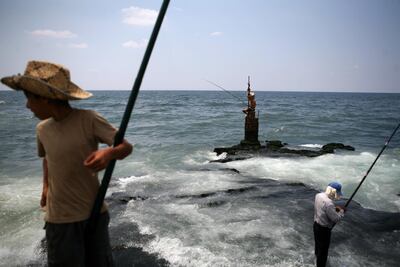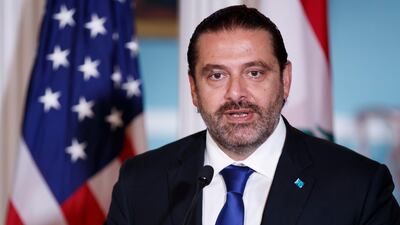Saad Hariri was cautiously optimistic about the prospects of a maritime deal with Israel and said that Lebanon is ready “to move from cessation of hostilities to a ceasefire” with the Israelis under a UN mechanism.
The Lebanese Prime Minister spoke at a roundtable in Washington attended by The National on Thursday about the set of political and economic challenges that engulf Lebanon, and the threat of US sanctions.
“Our bilateral relation is very important with the US when it comes to aid, security cooperation, refugees, we are hoping to develop it, and to bring investments in the oil and gas sector,” he said, as negotiations between Israel and Lebanon mediated by Washington advance toward potential agreement about the maritime border.
Mr Hariri was speaking right after a 40 minute meeting with US Secretary of State Mike Pompeo at the State Department.
Asked by The National if the Trump administration made any demands from the Lebanese government relating to the alleged missile factories operated by the militant group Hezbollah in the country, Mr Hariri confirmed that there are discussions but stopped short at giving details. "The issue of the missile factories was discussed in the past, and is now under discussion, it is an internal debate," he said.
“There is a give and take [with the US] but I can’t get into details.”
He added that his government is trying to “find the best way not to put Lebanon in danger.”
At the same time Mr Hariri pushed back, saying “we are not a police for the Israelis.”
He mentioned the daily recurring Israeli violations of the Lebanese airspace, and called for a more balanced approach in addressing both sides of the equation.
But then, Mr Hariri revealed that his country may be open for a ceasefire with Israel.
“We are working seriously in Lebanon in accordance with UN Resolution 1701 that’s built on cessation of hostilities,” he said before adding “we want to move from cessation of hostilities to a ceasefire and for that to happen, other things have to be implemented. They [Israel] have to implement a part and we have to do ours.”
He explained that any such mechanism would be under the United Nations.
UNSCR 1701 was approved in 2006 and helped end the July war by unanimously mandating a cessation of hostilities between Hezbollah and Israel.

Mr Hariri also said Lebanon is keen to conclude negotiations on the maritime border with Israel which the US has been mediating and submitted a proposal this summer.
“This is vital and very important economically for Lebanon to allow oil and gas exploration, we are hoping for real progress in September” he said.
“We know from Americans that Israelis are eager to reach an agreement on maritime.”
If a deal is reached, it would demarcate the maritime border between Israel and Lebanon allowing oil and gas giants to come and drill in a disputed zone in the Mediterranean.
But when asked about the elephant in the room when it comes to US-Lebanon relations and the issue of Hezbollah, Mr Hariri acknowledged the limitations his government is under when it comes to the issue of US sanctions on the party or its allies.
“We can’t change the US will on sanctions. They have laws and are pursuing them,” he said.
“We are trying to shield Lebanon…we explained our view and we know our message was received.”
He said Lebanon is not told who are potential targets.
“We saw reports but nothing is tangible yet.”
Over the last few months Washington has increased its pressure on Hezbollah and sanctioned its security official Wafic Safa, ranking parliamentarian Mohamad Raad in July, and has threatened to do more in its attempt to squeeze Iran and its proxies across the region.
“Any name or entity that comes on US OFAC [The Office of Foreign Assets Control] list, we deal with it firmly to shield Lebanon,” Mr Hariri. He rehashed Lebanon’s past efforts in absorbing sanctions that targeted the Canadian bank and different individuals and entities accused of facilitating funds to Hezbollah.
Mr Hariri said also that his Government “will put scanners and cameras on ports and crossings and airports across Lebanon to avoid smuggling.”
He said the US tone was very encouraging about the performance of the Lebanese army and that aid will continue.
Asking about Lebanon-Saudi relations, he said “we are working with Saudi on [potential] 23 economic agreements and similarly with the United Arab Emirates,” and hope to attract Gulf investments in Lebanon.

Mr Hariri did not reveal if Lebanon’s recent efforts led by the head of security General Abbas Ibrahim to release Western hostages from Iran and Syria were coordinated with the United States or others.
“That requires secret communication, we don’t talk about it till it succeeds,” he said.
But on one issue, Mr Hariri was in full disagreement with US on the Palestinian-Israeli front and what is known as “the deal of the century.” “Our position is clear, we didn’t go to Bahrain, we reject resettlement of Palestinian refugees in Lebanon, it’s constitutionally rejected, and we are opposed to it,” he said.
On his US visit, Mr Hariri, as well as meeting Mr Pompeo, met with undersecretary for political affairs David Hale, Assistant Secretary for Near Eastern Affairs David Schenker and US Assistant Secretary of Treasury, Marshall Billingslea.


